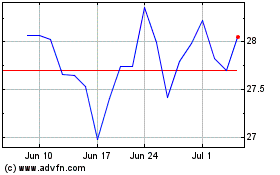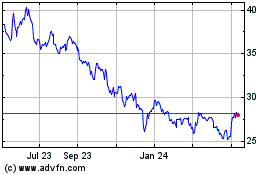By Eliza Collins and Stephanie Armour
WILMINGTON, Del. -- President-elect Joe Biden outlined his
proposal to give the federal government a bigger role in getting
Americans vaccinated against Covid-19, including setting up
federally supported community centers and mobile clinics for
delivering shots.
The plan, which Mr. Biden described in a speech Friday, marks a
shift in the coronavirus response that has so far involved the
federal government purchasing and distributing vaccines, while
relying heavily on states to administer the shots.
"This will be one of the most challenging operational efforts
ever undertaken by the country. But you have my word. We will
manage the hell out of this operation," Mr. Biden said, before
adding that he needed funding from Congress to make it happen.
"I'm optimistic, I'm convinced the American people are ready to
spare no effort and no expense to get this done," he said.
Mr. Biden said he would expand the use of a Korean War-era
national security mobilization law, known as the Defense Production
Act, in an effort to increase manufacturing of vaccines and
vaccination supplies. He also called for a "federally led, locally
focused public education campaign" to encourage Americans to get
the vaccine.
If manufacturing projections previously put forth by companies
hold up, Mr. Biden's pledge to administer 100 million doses of
Covid-19 vaccines during the first 100 days of his presidency
should be possible, according to manufacturing and supply chain
experts. But efforts to significantly ramp up vaccines and curtail
spread of the virus will depend on state partnerships and public
buy-in for some public health measures.
Mr. Biden on Thursday proposed a sweeping $1.9 trillion
coronavirus relief plan, with aid for households making up about
half of the plan's cost. He proposed spending $20 billion on a
national vaccination program. The plan also calls for sending many
Americans $1,400 checks and increasing the child tax credit, among
other things.
Getting a plan into motion will take time, health analysts said,
with urgency mounting because a more transmissible variant of the
virus has been found in multiple states.
"We remain in a very dark winter," said Mr. Biden. He and Vice
President-elect Kamala Harris had just been briefed on the
pandemic.
While Democrats praised Mr. Biden's relief efforts, Republicans
criticized the scope of the $1.9 trillion proposal, saying some
provisions were unnecessary. Democrats have narrow majorities in
the House and Senate. They would need Republican votes in the
Senate to pass most legislation due to rules in that chamber.
"A few of the line items in this proposal seem like they could
undermine the bill's own good intentions," said Sen. Chuck Grassley
(R., Iowa), the top Republican on the Senate Finance Committee.
"I'm open to more relief in light of this crisis, but I'll need to
more closely review the proposal and perhaps even see changes."
Sen. Bill Cassidy (R., La.) -- a member of the bipartisan group
that helped kick-start negotiations on a $900 billion relief bill
that lawmakers passed last month -- said Mr. Biden's proposal
seemed premature.
"We just put out $900 billion and it's not even out there yet,"
Mr. Cassidy said. "We really have to see how the epidemic goes, how
the vaccination goes, how the economy recovers and what is the
impact of the $900 billion."
Senate Democrats could pass some of Mr. Biden's proposed
policies through a process called reconciliation, which allows a
simple majority to pass certain legislation. However, that path
comes with restrictions, including a limited number of times it can
be used and rules that confine reconciliation bills to tax and
fiscal matters, rather than broader policies.
Some Democrats have said they were considering quickly passing
items with some bipartisan support, such as a round of $1,400
checks for many Americans, and trying to use reconciliation for
ideas that won't get Republican support.
Mr. Biden said he intends to introduce a second proposal focused
on recovery next month.
Many states have struggled to increase the administration of the
vaccine, citing inconsistent information on arriving doses from the
federal government and health departments already stretched thin
financially by the coronavirus. Congress on Dec. 21 approved $8.4
billion to help states with their efforts, but by then the
vaccination rollout was already under way, and some states say it
will take weeks to hire enough staff for more extensive vaccination
campaigns.
The federal government this week said it would stop holding back
second doses, reversing the strategy since the rollout began last
month. That guidance came several days after Mr. Biden's transition
team said the incoming administration would release all the
available supply.
Pfizer Inc. was asked by the U.S. government "only recently" to
start shipping second doses and still has millions of doses ready
to distribute at the government's signal, a Pfizer spokeswoman
said.
She said the company has shipped more than 15 million doses for
first and second injections and is confident in delivering on
future commitments.
Meanwhile, the Democratic governors of several states, including
New York, Colorado and Oregon, said Friday they were running out of
vaccine supply and criticized the federal government.
The federal government this week suggested states make the
vaccines available to people ages 65 and older, as well as those
with pre-existing health conditions. That rapid expansion created
massive demand, which was supposed to be met in part with increased
allocation of the vaccine from a reserve of second doses held by
the government. Now, the governors said, there wasn't that ready
supply from the reserve and the amount of vaccines flowing from the
federal government will actually decline next week.
New York Gov. Andrew Cuomo on Friday said the increase in demand
and decrease in supply was a problem created by the federal
government. "The theory was, 'We'll increase the eligibility but
we'll increase the allocation.' That hasn't happened," he said.
"This week, nearly 13 million total doses have been provided to
states to order for first and second doses, millions more than
other weeks, as second doses in reserve are fully made available to
order against," an Operation Warp Speed spokesman said Friday.
"States have yet at this time to fully order against their ordering
caps."
Mr. Azar expressed confidence in the distribution system
Tuesday. "We are releasing the entire supply we have for order by
states rather than holding second doses in physical reserve," Mr.
Azar said.
The success of the vaccination push rests in part on available
supplies and the ability of a workforce to provide shots. Mr.
Biden's plan seeks to address both challenges through the expanded
use of the Defense Production Act and a call for letting more
people, including retired medical professionals, administer
vaccines with training. He would also expand the use of pharmacies
to provide vaccines.
The federally backed community vaccination centers would involve
the Federal Emergency Management Administration, the National
Guard, and state and local teams. The administration would use
federal resources and its emergency contracting authority to help
launch the centers.
Andrew Duehren, Melanie Grayce West and Jared S. Hopkins
contributed to this article.
Write to Eliza Collins at eliza.collins@wsj.com. and Stephanie
Armour at stephanie.armour@wsj.com
(END) Dow Jones Newswires
January 15, 2021 18:04 ET (23:04 GMT)
Copyright (c) 2021 Dow Jones & Company, Inc.
Pfizer (NYSE:PFE)
Historical Stock Chart
From Mar 2024 to Apr 2024

Pfizer (NYSE:PFE)
Historical Stock Chart
From Apr 2023 to Apr 2024
